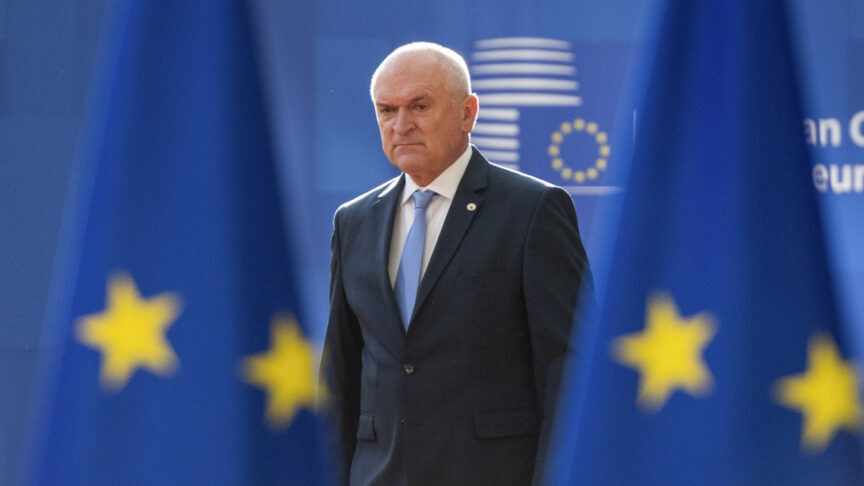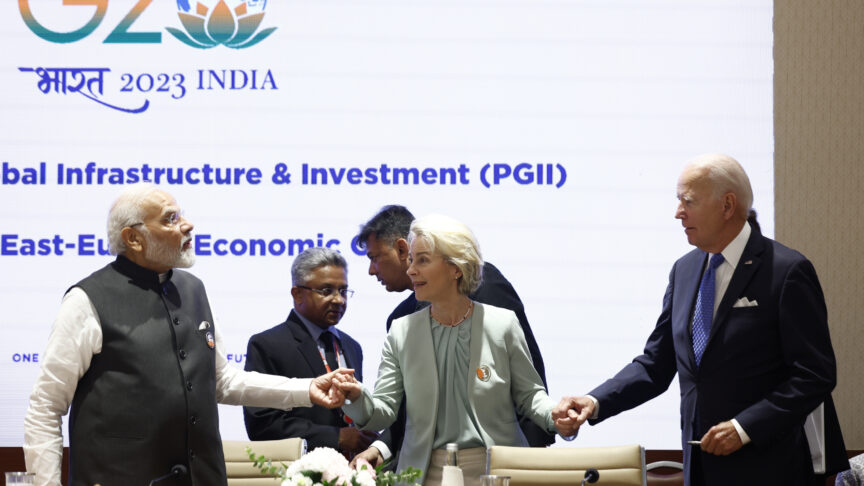Macron, Merkel, and Europe’s “moment of truth”
The French president has laid down the gauntlet by warning the European political project could end if it fails to embrace burden-sharing. One of two scenarios could now play out.
The Macron thunderbolt struck again. In his recent interview with the Financial Times, the French president set about whipping up a political storm. Ahead of this week’s meeting of European Union heads of state and government, he raised the stakes skyward by linking financial solidarity, or joint bond issuance, with the survival of the EU as a political project. The newspaper reported Macron as warning that the union and the euro are at risk if wealthier member states do not create new mutualised debt instruments to help their poorer southern partners. He described this as “moment of truth, which is to decide whether the EU is a political or just a market project.”
This could go either of two ways.
Optimist scenario: Can the Macron method foster European solidarity?
Overcoming different visions for the European project will require a reconciliation of philosophies and politics. The French president has positioned himself as offering a third route forward, navigating between north-western and southern European countries. The financially healthier north is reluctant to pay for the weaker south. Hence, the financial proposition put forward by nine European countries – France, Spain, Italy, Belgium, Luxembourg, Ireland, Portugal, Greece, and Slovenia – and the European Central Bank to push for coronabonds has been met with fierce opposition from Germany and other fiscally conservative European countries.
The difficulty in dealing with such divergent visions for Europe is that, for the southern Europeans, this is about survival not just of the European project but actually of ordinary people. In the north, meanwhile, politicians argue that there is no need to jump to joint debt issuance in order to provide help. What would be a technical solution to a political problem in the south is perceived in the north as a political solution to a technical problem.
There is prehistory to this, of course. The last financial crisis led a number of southern European countries to adopt austerity measures that partly explain the detrimental health situation they are now in. One political scientist argues that, “there is a direct link between the weakness of the Italian health system and the austerity measures imposed by the troika”. Macron is alive to southern views that the north still has some making up to do.
Europeans could decide that this is the watershed moment to take decisions that alleviate inequalities between national systems and empower the EU to bring together a firm and fair European response to the pandemic. For the sake of the European project, financial sustainability and solidarity will have to coincide.
What would be a technical solution to a political problem in the south is perceived in the north as a political solution to a technical problem
Pessimist scenario: Macron is setting the EU up for failure
Macron’s interview could make things much worse. In fact, his words may have already increased the EU’s likelihood of failure.
The debate about coronabonds, or eurobonds as they have long normally been called, is politically toxic in Germany and other northern countries. There is no domestic equivalent to eurobonds even between the German federal government and the German states. It would be time-consuming – on the European level, it would mean treaty change. And northerners already consider that they have made significant concessions towards the south, in the form of the European Central Bank’s continued sovereign bond purchases and the European Stability Mechanism borrowing-side debt mutualisation. Many Germans feel they are already demonstrating solidarity through other measures. Indeed, extending further assistance to the south in ways other than eurobonds remains on the table.
So Macron has plunged into this unpropitious situation by insisting on an instrument that will not even result in any help within the next year, given the time it would take to change treaties and create the bonds. To many in the north, this proves that all this is not really even about helping people threatened by the immediate health crisis, but about finally pushing through a debt mutualisation that many have long desired. What they see is proponents seizing upon a situation where it would look morally wrong to say ‘no’.
Macron could offer something in return to get this through. He of all people should know that only a European ‘grand bargain’ would make it possible for Berlin, The Hague, and others to agree to one of the most toxic issues in their own politics. The French president fought for his broad vision of a relaunch of Europe during his early years in office. Back then Berlin remained largely satisfied with the status quo, even if came at the cost of alienating its last remaining big ally within the EU. There is nothing in sight for any new grand bargain or even a successful last-minute piece of horse-trading. Macron has made this issue toxic for Germans and northerners only, and by doing so could even dent Germans’ traditional pro-European attitudes.
This week’s European Council meeting will show whether optimists or pessimists about Macron’s strategy are right. In the meantime, Angela Merkel has declared that Germany will show more European solidarity than already agreed on, such as through “EU bonds”. This could prove that Macron has succeeded in changing the German position. But since EU bonds are very different from eurobonds, even this could also yet prove the pessimists right – most importantly, in the eyes of disgruntled electorates whose expectations are now sky-high for change this time around.
The European Council on Foreign Relations does not take collective positions. ECFR publications only represent the views of their individual authors.


